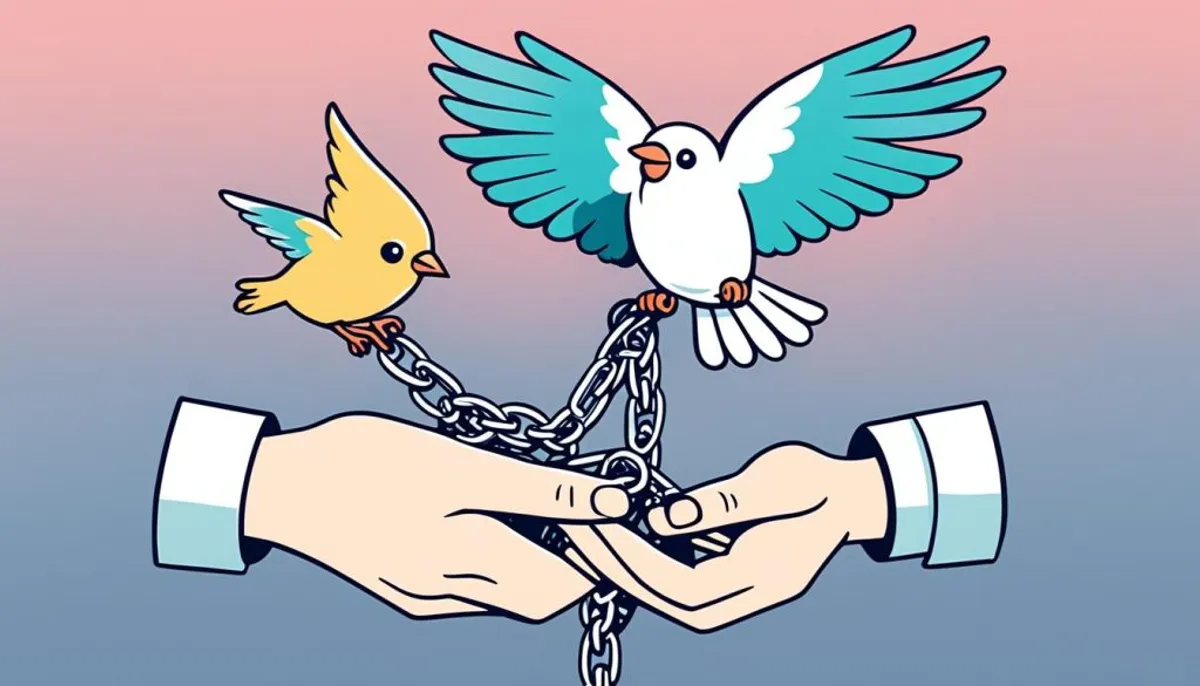Social media connects us with people worldwide. It offers a space for free speech and chatting. But, its growing influence raises a big question: should there be rules?

Is regulating social media necessary? Everyone is talking about it – from government folks to tech gurus to everyday users. Some say it’s key for safety, fighting lies, and protecting privacy. Yet, others worry it could limit our free speech, stifle innovation, and give the government too much power.
Key Takeaways:
- Social media regulation is a hot topic.
- Regulation can shield users from harmful posts and keep private things private.
- There’s debate over how much control the government should have.
- Setting rules for online platforms is part of the discussion.
- Regulatory actions are about managing what’s on social media properly.
The Benefits of Regulating Social Media
Putting rules on social media helps make the internet safer and more trustworthy. By setting strong regulations, we can stop fake news and bad information from spreading. This makes sure that the information people get is accurate and reliable, building trust.
Rules also protect users from bad content. They let social media sites deal with hate speech, cyberbullying, and online harassment. This makes the internet a safer place to talk and share ideas without the fear of getting hurt or bullied.
Regulating social media also means people use it more wisely. By making and applying guidelines, we encourage good behavior online. We teach users about how their actions could hurt others, including the mental health impact they may have. They learn the importance of thinking before they post.
Another benefit is that it keeps user information safe. With the right rules, platforms can protect personal data from being misused. This makes people feel more secure, knowing their privacy is taken seriously.
Regulating social media makes for a better and safer online world. It fights misinformation, keeps users safe, promotes responsible use, and protects privacy.
| Benefits of Regulating Social Media | Description |
|---|---|
| Combating Misinformation | Regulations help stop fake news, ensuring only true information is shared with users. |
| Protecting Users from Harmful Content | Rules can fight against hate speech and cyberbullying, making the internet a safer place. |
| Encouraging Responsible Use of Social Media | Guidelines and education lead to more ethical and responsible behavior on these platforms. |
| Preserving User Privacy | With regulations, user data is kept safe, building trust and confidence in the platforms. |
The Challenges of Regulating Social Media
Regulating social media is complex. We strive for user safety and responsible sharing. However, we must also consider the challenges of social media in education, as this can threaten free speech, cause bias, risk government overreach, and slow down industry growth.
The Threat to Freedom of Speech
Regulating social media might limit free speech. Moderation aims to stop harm but could block diverse opinions. Finding a balance is key to keeping online spaces democratic.
Selective Enforcement and Bias
Regulations could lead to biased enforcement. This could unfairly target some users or content. It’s vital to regulate fairly, no matter the user’s views.
“Balancing the enforcement of regulations while remaining objective is a complex task for social media platforms. Failing to do so can erode trust and credibility among users.”
Potential for Government Overreach
There’s a risk of too much government control in social media. This could lead to privacy loss and too much online surveillance. We must ensure social media keeps its autonomy to avoid this.
Hindering Innovation and Growth
Too many rules could hurt the social media industry. They may block new ideas, lessen competition, and slow technology advances. This is particularly relevant when considering platform selection for brands. Balancing regulation with innovation is crucial.
“Creating a regulatory framework that fosters innovation while addressing concerns of user safety requires ongoing collaboration between governments, tech companies, and other stakeholders.”

It’s crucial to find good solutions for safety, speech, and innovation. A balanced approach to regulation will create a better online world for all.
The Role of Content Moderation
Content moderation is key in protecting users and preserving brand reputation. As user-generated content on social media grows, effective moderation is vital. It ensures the online space is safe and engaging, and also supports fan engagement projects that enhance interaction and connection between brands and their audiences.
Ensuring User Safety
The main goal of content moderation is to protect users from bad or unsuitable content. Moderators look at posts, comments, and messages. They remove content that breaks community rules, including those that threaten freedom of speech. This stops the spread of hate speech, harassment, false information, and other harmful content.
“The role of content moderation goes beyond simply enforcing rules and guidelines; it is about fostering a welcoming community where users can interact safely and respectfully.”
Preserving Brand Reputation
Content moderation also matters a lot for preserving brand reputation. Social media is crucial for businesses to reach people. By removing bad content, moderation helps brands look good. It prevents them from being linked to negative material.
This also helps brands guide their story. By watching and managing online content, brands can align with their marketing plans. They keep a positive and consistent image, which is essential considering the mental health impact of negative online interactions.
The Role of Human Moderators and Automated Filters
Content moderation uses both human moderators and automated systems. Humans understand context and culture better. They make decisions on complex cases. These can be about a post’s intent or judging potential harm.
Automated systems are crucial too. They manage the huge amount of online content. These systems have rules and use machine learning to spot bad content. But, they’re not perfect and need regular updates and checks.
Content Moderation Best Practices
Effective moderation needs clear rules and training for moderators. It’s important to balance user safety and free speech. Platforms should have clear ways for users to challenge decisions.
Regular checks and user feedback can make moderation better. Working with the community gives everyone a role in keeping the online space safe and kind, especially when it comes to providing mental health support through social media.
| Benefits of Content Moderation | Challenges of Content Moderation |
|---|---|
| Protects users from harmful content | Potential for selective enforcement |
| Preserves brand reputation | Concerns about freedom of speech |
| Allows brands to control their narrative | Potential for government overreach |
Social Media Moderation and Free Speech
One main concern with content moderation is it might limit free speech. Critics believe strict rules could suppress minority or unpopular opinions. There are worries about governments abusing these rules to quiet protesters or critics.
“The right to share our views is crucial and must be protected on social media,” says Sarah Thompson, a digital rights advocate. “Moderation is necessary to keep users safe and stop harmful content, but we must find a balance that respects free speech.”
Some are concerned that fears of censorship might make users hold back, worried their posts will be removed. The thought of government meddling in moderation decisions makes people doubt if social media, including the zhihu question-and-answer platform, can truly support diverse views.
In response, some suggest we need clearer moderation rules to build trust and accountability. It’s key to tackle concerns about censorship and government involvement. We must ensure platforms are places for free discussion and varying opinions.
The Role of Public Debate
Public debate is vital for the future of moderation on social media. Talking about how to balance moderation and free speech can lead to better rules. It’s crucial for lawmakers, platforms, and society to talk together. This helps find solutions that consider everyone’s needs.
“Discussing moderation and free speech openly and with knowledge is crucial,” says Mark Davis, a social media governance expert. “It helps us protect both user safety and freedom.”
Encouraging open talks and an accepting environment helps, especially in the context of social skills development in kids. These discussions can lead to fair moderation that respects free speech. They ensure online spaces are safe and respectful for everyone.
| Concerns | Solutions |
|---|---|
| Fear of censorship | Transparent moderation policies Appeals process for content removal |
| Risk of government influence | Clear separation between government and platform decision-making External oversight and accountability mechanisms |
| Unfair targeting of unpopular opinions | Consistent enforcement of guidelines Peer review of moderation decisions |
The Mental Health Impact of Content Moderation
Content moderation is key in keeping online spaces safe. It shields users from harmful content. But, it can harm the mental health of the people doing the job. Seeing disturbing content daily can cause stress, anxiety, and more.
Moderators have to deal with upsetting content like violence, hate, and explicit images every day. This can be very hard on their mental and emotional health.
Many say they don’t get enough support from their workplaces. They often lack training, mental health care, and a supportive environment. This makes things even harder for them.
Companies need to take care of their moderators. They should offer regular mental health checks, counseling, and training. Additionally, providing mental health support through social media can help moderators deal with their tough job.
“The mental health impact of content moderation cannot be understated. It is vital for companies to acknowledge and address this issue to ensure the well-being of their moderators and help them navigate the challenges they face.”
When companies focus on moderators’ mental health, the workplace gets better. This also improves how they do their job. Moderators can handle their work better when supported.
Looking after the mental health of content moderators is crucial. It’s not just the right thing to do—it’s essential for a healthy online world. Companies should put money and effort into full mental health support for their team.
Balancing User Safety and Freedom of Speech
Finding the right balance between user safety and free speech on social media is tough. We need to protect people’s rights to speak and share, while preventing harm. This balance is crucial for social media rules.
Keeping users safe is key for a secure online space. Yet, we must not limit freedom of speech too much. The goal is to find a balance with clear and fair rules.
Incorporating a balanced approach helps build a positive online community. It lets people speak their minds but stops harmful stuff from spreading. A good set of rules helps social platforms keep everyone safe and free, while also acknowledging the importance of social media symbolism in shaping user interactions.
“The power of social media platforms lies in their ability to connect people and enable the sharing of diverse ideas and perspectives. Achieving a balance that values user safety without impeding free speech is crucial for a thriving digital society.”
It’s important to know where to draw the line between government control and platform independence. Regulations should prevent too much government influence and block harmful content too.
Open dialogue and collaboration with everyone involved can help find the right balance. Talks should consider the different challenges and cultural aspects.

Ensuring a Balanced Approach to Social Media Regulation
To balance user safety and free speech, consider these points:
- Regulatory actions should focus on safety but allow free speech.
- There should be clear rules on how to handle bad content.
- Content moderation should be transparent and accountable.
- Users should help by reporting content that’s a problem.
By getting the balance right, we create a safer, open digital world, including spaces like the fediverse. This lets us keep our freedom to speak and share.
The Future of Social Media Regulation
The landscape of social media is always changing. With these changes, we are constantly discussing how to regulate social media in the future. Advances in technology and shifts in how people use platforms bring forth new regulatory challenges. This section delves into these evolving discussions, including the role of qlan esports social media, and what they might mean for the future.
When we think about regulating social media, we have to find a balance. The effects on users, freedom of speech, and innovation are important to consider. Rules can help fight fake news and online bullying. This makes the internet safer and encourages good behavior. Yet, too many rules might slow down growth and limit the variety of voices online.
The Role of Stakeholders
Many groups have a role in shaping the rules for social media. This includes governments, social media companies, non-profits, and users. Working together is key. It helps ensure safety online while also protecting freedom of speech.
A good step for regulation is making clear rules about what is okay to post and how to enforce these rules. These guidelines need to be fair, open, and available for review. This way, we can manage concerns about bias in how these rules are applied.
“Regulating social media is a complex task that requires collaboration and thoughtful consideration. As technology continues to evolve, we need to adapt our regulatory frameworks to ensure they remain effective and relevant in a rapidly changing digital landscape.” – Jane Smith, Digital Policy Expert
Ensuring Accountability
Holding social media platforms accountable is vital. Platforms should be clear about how they check content. Regular checks and reports can help make sure platforms stick to the rules. This also addresses issues of bias and fairness in content moderation.
Managing user data and privacy responsibly is also part of accountability. As rules change, it’s important to respect user privacy. At the same time, we must allow innovation and the delivery of personalized content.
The Importance of ongoing Dialogue
The debate on social media regulation is ongoing. It’s important to keep talking with all involved parties. This includes users, non-profits, academics, and industry leaders. Through open discussion, we can keep up with changes and shape rules that support a vibrant, diverse online world.
Pros and Cons of Social Media Regulation
| Pros | Cons |
|---|---|
| Combatting misinformation | Potential for stifling innovation and competition |
| Protecting users from harmful content | Threat to freedom of speech |
| Encouraging responsible use of social media | Selective enforcement and bias |
| Preserving user privacy and data protection | Potential for government overreach |
Conclusion
Regulating social media is a hot topic with lots of debate. Some say it protects us from bad content and false info. It aims to create a safer online space, keeping us safe and keeping digital trust.
But, others worry it might limit our freedom to speak and lead to too much government control. Finding a balance is key. We need to protect free speech and avoid muting different opinions. This needs careful thought and clear rules to protect democracy in the digital age.
Talking about social media rules is ongoing and complex. Including views from users, lawmakers, and tech companies is crucial. We must seek common understanding and be open to ensure online safety, freedom, and a strong digital community.
FAQ
Should social media be regulated?
There’s a big debate on if we should regulate social media. Some people say it’s necessary to protect users from bad content and lies. Others are worried it might limit free speech and lead to government control.
What is the importance of regulating social media?
By regulating social media, we can fight against fake news and protect users. It helps keep the online world safe from hate speech and cyberbullying. And it makes sure social media is used responsibly, keeping our private info safe while ensuring robust privacy and security.
What are the challenges of regulating social media?
When it comes to controlling social media, there are a few problems. People worry it might limit our freedom to speak out. There’s a risk of enforcing rules unfairly and being biased. Plus, it could stop new ideas and growth in the social media field.
What is the role of content moderation?
Content moderation is key in keeping harmful stuff away from users. It helps brands look good too. This can be done by people or computers, making sure only the good content gets through. However, it's also important to consider the mental health impact of content exposure on users.
How does social media moderation impact free speech?
There’s a lot of talk about how moderating social media affects our freedom to speak. Some folks think it might lead to censoring and silencing less popular views.
What is the mental health impact of content moderation?
Looking at bad content all day can really hurt moderators’ mental health. It can cause stress and other mental health problems. Companies need to do more to support them.
How do we balance user safety and freedom of speech?
Finding a balance between keeping users safe and free speech isn’t easy. We need clear and fair rules. And we need to be careful about how much power the government has over social media.
What is the future of social media regulation?
It’s hard to say what’ll happen with social media rules. Things keep changing, so we must keep talking and thinking about the best ways to handle it.
RelatedRelated articles



